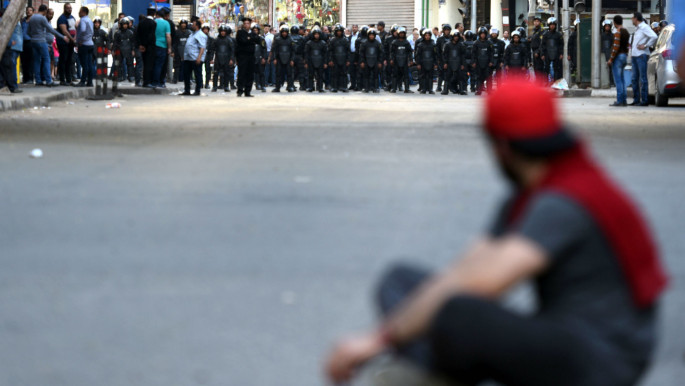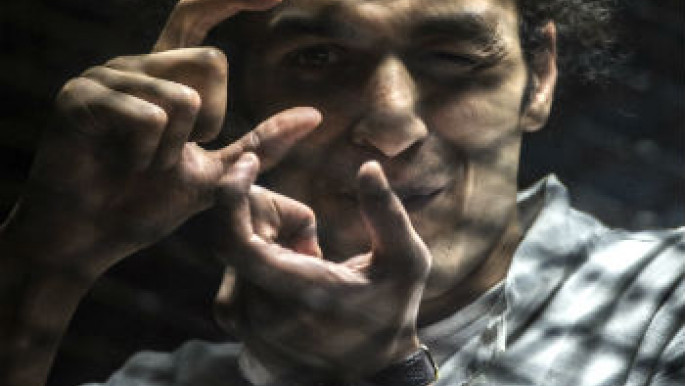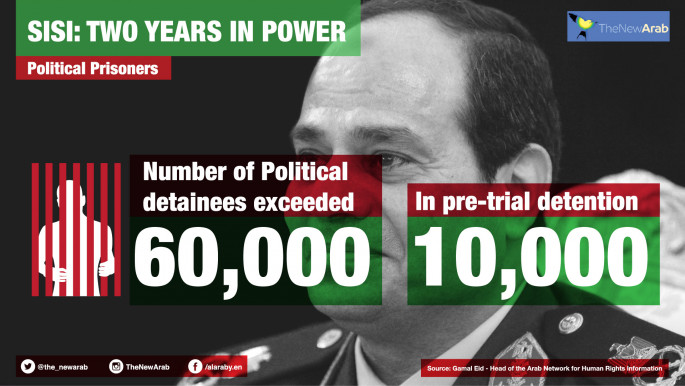Police state Egypt: Jailing political opposition
Last month's presidential decree saw another odd batch of detainees pardoned, but many political prisoners are left behind bars amid a widespread crackdown on virtually anyone who opposes the regime.
In September, Egypt's President Abdel Fattah al-Sisi issued pardons for 759 prisoners, allowing them to be released on the occasion of the Eid holiday. Freedom, however, was only granted to those convicted of criminal offences - while political detainees were excluded from the list.
Between 40,000 and 60,000 political prisoners have been jailed in Egypt since the military ousting of President Mohammed Morsi in July 2013.
An in-depth report published by the Arabic Network for Human Rights Information (ANHRI) in early September set the number as 60,000 out of around 106,000 prisoners in total.
These are only estimates, as the Prisons Authority does not provide any official public figures.
ANHRI reported that Egypt had built 13 new prisons to cope with the increasing number of citizens imprisoned since the coup against Morsi.
There are today 504 detention centres in the country. Before the 2011 revolution, there were 485 detention facilities, with the 19 new prisons built in the years since.
Since Morsi's overthrow, Egyptian authorities have carried out a wide-ranging campaign directed at a variety of political opponents. Targeted are members and supporters of the Muslim Brotherhood, leftists, activists, young people posting and sharing political statements on social networks, human rights defenders, journalists and artists.
It is hard to know exactly where the red line lies, given the diverse range of people who have been arrested, charged or detained. No one can predict if and when it will be their turn to be caught up in the dragnet for some abitrary reason.
"There is actually not a specific group that the regime is aiming at, anyone can be potentially put in jail," said Amr Ismaeil, researcher on detention facilities and torture prevention at the Egyptian Initiative for Personal Rights (EIPR).
Ahmed Benchemsi, communications and advocacy director for Middle East and North Africa at Human Rights Watch (HRW), agreed. "Anyone who opposes the regime is a dissident," he told The New Arab.
| Article continues below picture |
 |
| Protests in Egypt are always met with a heavy police reaction [AFP] |
Dr Taher Mokhtar, a member of the Doctors' Syndicate's Freedoms Committee, was arrested along with his roommates on 14 January after security forces stormed and searched his flat in downtown Cairo.
The doctor, who advocates for medical treatment for detainees, was questioned as security officers found one print statement of a campaign called Medical Neglect in Places of Detention is a Crime.
"They took my ID and asked me questions like 'What is this campaign about?', 'What are your political views?' and 'What are you planning to do?'"
Two hours later, he was taken with his roommates to the Abdeen police station and held until the next morning when they were charged of "carrying posters inciting to protest".
Dr Mokhtar's arrest was one in string of raids by Egyptian security forces on apartments in central Cairo in the lead-up to the anniversary of the 25 January revolution.
Many activists back then predicted state attempts to prevent street protests marking the occasion, but few imagined they would be arrested for having a leaflet in their house. Dr Mokhtar only possessed campaign documents of the doctors' union about prisoners' health conditions under detention and the rights of prisoners to decent healthcare.
After seven months in detention, Dr Mokhtar was discharged in August, with no proof of guilt found against him. "Pre-trial detention is being used a lot as a punitive measure for critics of the government with prisoners kept inside for month, or years even," the physician said.
"This regime is definitely more oppressive and repressive than the previous ones. Nobody is safe."
A long-time leftist and union activist, Mokhtar is well known by the Egyptian National Security. He previously lived in Alexandria, where he was detained twice. A former board member of the Alexandria Doctors' Syndicate, and one of the leaders of the 2012 and 2014 doctors' national strikes, Mokhtar was actively involved in campaigns demanding justice for victims of police violence such as Khaled Said, the young man whose brutal murder in 2010 sparked the 25 January revolution.
 |
The only thing a military dictatorship can do is to hold a grip on society and silence people. To do that you have to become a police state |  |
In December 2013, a photo of the doctor badly beaten by the police during a small protest for Khaled Said went viral on social media.
Two days after Dr Mokhtar's release in August, fellow activist Mahienour el-Masry - a lawyer - was also freed.
She had been sentenced at the end of May, along with two others, to 15 months in prison on charges of "protesting without authorisation" and "assaulting police officers" inside the Raml police station in Alexandria.
Her case dated back to March 2013. Back then, in the time of Morsi's rule, pro-Muslim Brotherhood supporters allegedly harrassed political activists and took them to the police station. A group of lawyers, including El-Masry, seeking to assist the activists were prevented from entering and were assaulted by police personnel. In reaction, lawyers and activists staged a sit-in at the station. They were arrested but freed the following day.
The case was reopened a year and a half later. The defendants were first handed a two-year prison sentence in February 2015, before the verdict was reduced to one year and three months after an appeal in May.
"Most of us, lawyers and activists, stand against the military regime, this is why I think the case was opened again in Sisi's reign," El-Masry noted, unsurprised.
"The only thing a military dictatorship can do is to hold a grip on society and silence people. To do that you have to become a police state."
 |
|
| Read more about photographer Shawkan's case [Getty] |
This was not the first time the prominent lawyer and revolutionary socialist activist was jailed. In 2014, she served four months of a six-month sentence on charges of "illegal protesting" - in violation of the Protest Law - during the Khaled Said murder retrial in December 2013.
The human rights lawyer was released in September 2014.
Ismaeil, the researcher at the Egyptian Initiative for Personal Rights, cited the story of photojournalist Mahmoud Abu Zeid (known as Shawkan) who was arrested on 14 August 2013 while covering the police dispersal of the Muslim Brotherhood supporters' sit-in Rabaa al-Adawyia Square, calling the case "politically motivated".
Shawkan has served more than three years in jail without charge - despite the law setting a two-year maximum period for pre-trial detention. He remains in custody while his health status is deteriorating, due to a lack of proper medical care.
Sherif Mohyeldeen, EIPR's researcher on counter-terrorism and human rights, pointed to the case of journalist Ismail Al-Iskandarani, an expert on Sinai affairs, who was arrested on 29 November 2015 at Egypt's Hurghada airport.
He was returning from a seminar tour in the US and Europe, when the authorities searched his laptop and found articles he wrote on Sinai and other political issues.
"Before his arrest, Al-Iskandarani had been living abroad for over a year since he felt uneasy working in Egypt because of the sensitive nature of his writings," Mohyeldeen said.
The journalist is facing charges of joining an outlawed group - the Muslim Brotherhood - and disseminating false news.
Last month, his imprisonment was renewed for another 45 days.
 |
One woman died because she was denied healthcare, another delivered her baby in the cell because they refused to let her out |  |
Among other examples of political detention - in May a group of young video performers named Street Children were detained for posting YouTube videos. The clips included satirical performances commenting on Egypt's politics, mocking the president and his supporters.
The prosecution accused the group of inciting protests aiming to undermine the country's stability.
Four members were freed from prison in September, after more than 150 days in pre-trial detention. The group's arrest was criticised by rights groups for being a clear violation of freedom of expression.
Conditions in Egypt's prisons and police stations are severely poor. Amnesty International's 2015-16 report said cells were badly overcrowded and unhealthy, and in some cases prisoners were forbidden from receiving food, medicine and other items from families and lawyers.
Over the past year, deaths in custody were reported as a result of torture, ill-treatment and lack of access to adequate medical healthcare.
 |
|
| After two years in power, Sisi had jailed tens of thousands of political prisoners [Click to enlarge] |
"At Damanhour prison, we were 28 women piled into a four-by-six [metre] cell, some with 2-3-year-old kids, locked up for 20 hours every day, a filthy bathroom with water running for only two hours a day," El-Masry recalled.
"One woman died because she was denied healthcare, another delivered her baby in the cell because they refused to let her out."
The lawyer explained that Al-Qanater prison was yet psychologically harder - as political detainees were kept isolated from other inmates, sometimes not allowed to talk to each other. They were also prohibited to receive letters, books or other goods from their relatives.
"Though I was lucky as a doctor to be better treated while at Tora prison, many of my fellow inmates with diseases were receiving medical assistance only after long delays," Mokhtar said. "It would take a lot of banging on the cell's door before they were taken to a health clinic, or they had to wait up to two months to undergo an operation."
In a report released at the end of last month, HRW documented grim conditions in Scorpion prison, which holds most of those deemed "enemies of the state" - including most of the top leaders of the Muslim Brotherhood.
Prisoners there have been held without beds, mattresses, or basic necessities for hygiene. They have been beaten, confined for weeks, and denied medication. Visits from relatives and lawyers are irregular, extremely short, and banned for long periods, reports the human roghts group.
Pardoning and releasing prisoners on religious feasts or national holidays, as the Egyptian president does every now and then, is but a token measure when the judiciary system requires reform as a whole.
"A justice system in which tens of thousands of political activists are jailed because they are expressing their opinion in a peaceful way is not a normal system," said HRW's MENA communication and advocacy director.
"This mockery of justice should stop."





 Follow the Middle East's top stories in English at The New Arab on Google News
Follow the Middle East's top stories in English at The New Arab on Google News


